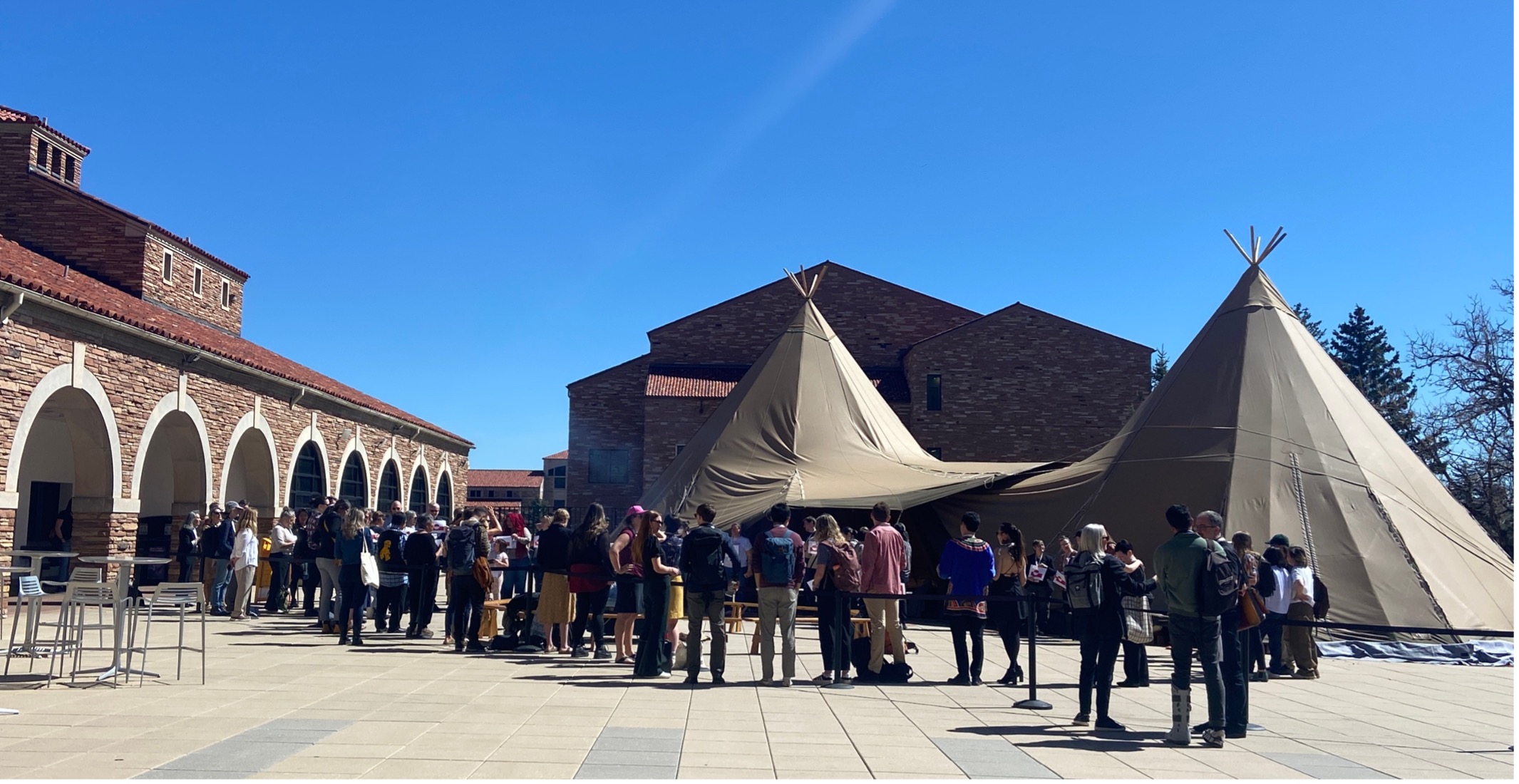
The Arctic Data Center (ADC) Community Engagement and Outreach Coordinators, Angie Garcia & Nicole Greco, joined 1200 international scientists, researchers, Indigenous knowledge holders, and community members in attending the International Conference on Arctic Research Planning (ICARP) IV and Arctic Science Summit Week (ASSW) in Boulder, Colorado this past March. While the ICARP IV Summit occurs every 10 years and focuses on engaging the international community in organizing and prioritizing the topics for Arctic research for the next decade, ASSW is an annual event aimed at providing opportunities for coordination, cooperation, and collaboration between Arctic research organizations.
Angie and Nicole represented the ADC during the Summit and co-led various activities throughout the 8-day conference. Read on for more details about their experience!
FAIR and Responsible Data Collection workshop at the APECS/PSECCO Polar Early Career World Summit, March 23rd
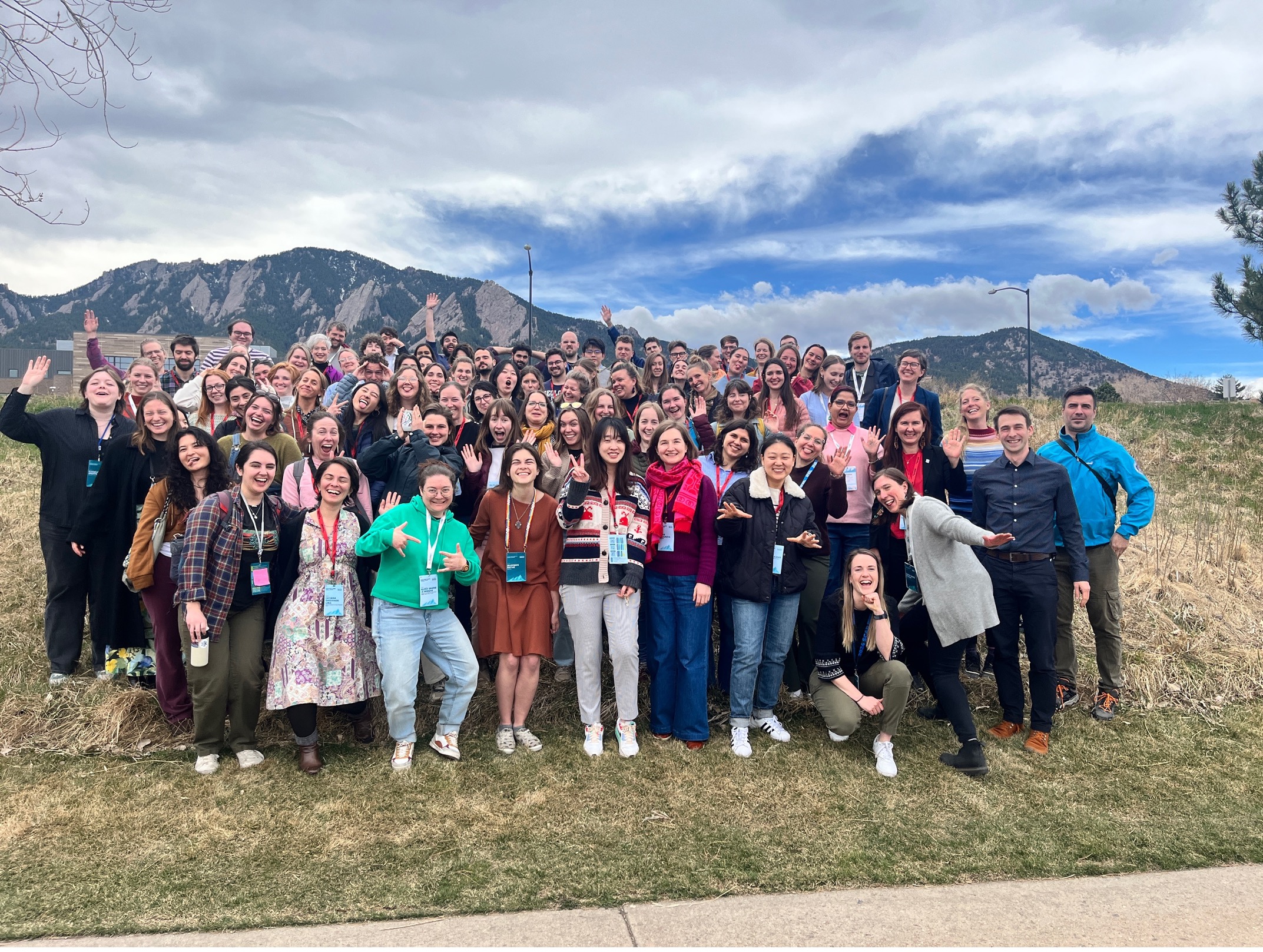
Participants and organizers of PECWS. Photo Credit: Lauren Lipuma, CIRES, CU Boulder.
Beginning on the third day of the conference, the Association of Polar Early Career Scientists (APECS) and the Polar Science Early Career Community Office (PSECCO) held the 3-day 2025 Polar Early Career World Summit (PECWS) alongside ICARP IV and ASSW. PECWS brought together an international audience of early career researchers, professionals, and Indigenous scholars and knowledge holders connected to the Arctic, Antarctic, and wider cryosphere to shape polar research priorities ahead of the next International Polar Year (IPY, 2032-33), provide networking opportunities among early careers, and amplify the voices of the polar early career community.
Our team was invited to hold a 1.5-hour workshop at PECWS focused on findable, accessible, interoperable, reusable (FAIR) and responsible data collection in polar science. Building upon previous lessons taught during ADC trainings, Greco’s workshop began with an introduction to the ADC, the FAIR principles, and responsible research practices. This was followed by a breakout activity focused on metadata best practices where participants evaluated metadata from published datasets based on a rubric to determine if the metadata was complete and if the study could easily be replicated by others. At the end of the activity, each group shared their findings and the workshop ended with a presentation of helpful resources and papers for early career researchers to learn more about the covered topics. Audience feedback was very positive and participants noted how helpful the hands-on activity was for thinking about their own research footprint throughout their careers. You can find a similar activity in the curriculum from our most recent virtual data science training.
US Arctic Observing Network lightning talk during “Tools and Strategies toward Coordination, Integration & Effective Utilization of the Arctic Observing Network” session, March 24th
This session highlighted the value of partnerships across federal and state agencies, local communities, and academic institutions – both the US Arctic Observing Network (US AON) and the broader Arctic research community.
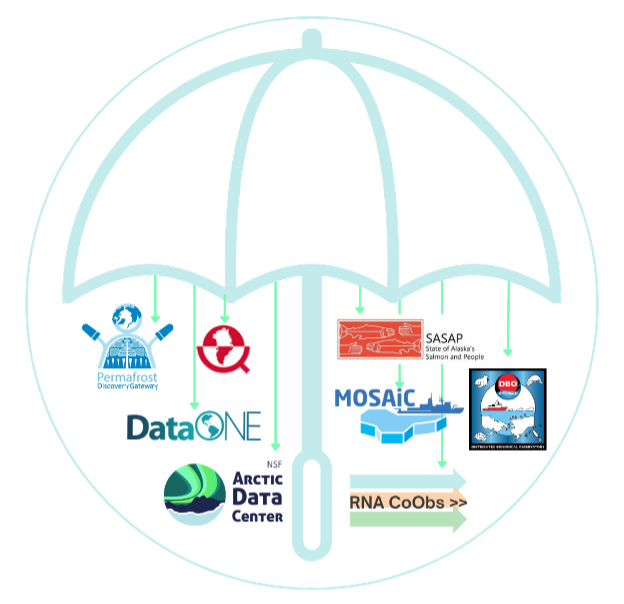 Garcia delivered a lightning talk during the “Tools and Strategies for AON Implementation, Integration, and Utilization Session”, alongside other projects and organizations aiming to advance the Arctic observing network. While the ADC does not directly conduct any Arctic observations, we support the research community by providing the infrastructure to host, preserve, and share Arctic observations. The ultimate goal is to ensure this data remains accessible and reusable.
Garcia delivered a lightning talk during the “Tools and Strategies for AON Implementation, Integration, and Utilization Session”, alongside other projects and organizations aiming to advance the Arctic observing network. While the ADC does not directly conduct any Arctic observations, we support the research community by providing the infrastructure to host, preserve, and share Arctic observations. The ultimate goal is to ensure this data remains accessible and reusable.
However, challenges remain, including sustainable funding, data heterogeneity, and integration across systems. Garcia emphasized the importance in creating interoperable systems, securing sustainable funding, enabling scalable system upgrades, and fostering cross-project collaboration.
Following the lightning talks, a Q&A and a visioning session invited attendees to further explore what the future of US AON could look like in the context of Sustainable Arctic Observation Network (SAON), Fourth International Conference on Arctic Research Planning (ICARP IV), and International Polar Year (IPY). Key takeaways from this visioning session included bridging the gap between federal, local, and other information infrastructures to build mutual incentives for information sharing; increase engagement and outreach; exploring different sustainability models to archive and maintain data repositories.
Navigating the New Arctic Data Portal Office Hours, March 26th
In collaboration with the Navigating the New Arctic Community Office (NNA-CO), we hosted office hours for Arctic researchers to ask questions about our data portal tools and systems. As data submissions to the ADC continue to grow in scale, we recognize the need to provide both hands-on and face-to-face support for researchers submitting to the repository and this session was designed with that goal in mind. We also aimed to support those who have already uploaded data and are seeking for a centralized data portal to organize and share their work with the broader community.
During this session, we had a couple of attendees ask about how our resources and expertise could support their work in different communities in Alaska, particularly in defining what can be considered sensitive data. Others were curious about how the portal system could be leveraged to display their large model data highlighting water infrastructure in Alaska. Many attendees were curious about the tools and resources we already offer, so it served as a reminder that continued outreach is key to making this visible and accessible to the border Arctic research community.
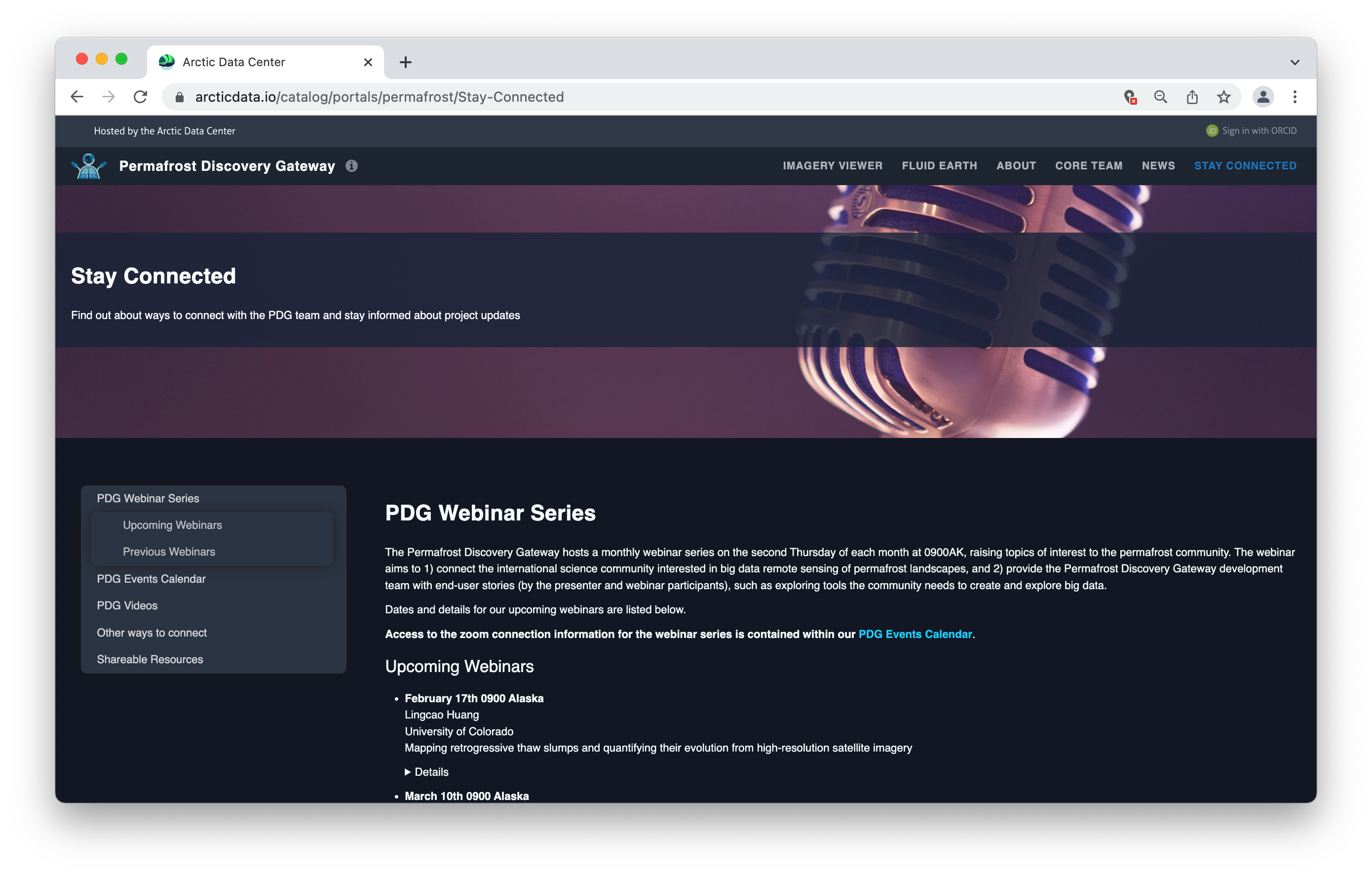 In spotlighting this session, it’s worth acknowledging the role that ADC portals play in helping us to better serve the Arctic researcher community. The Permafrost Discovery Gateway has been instrumental in bringing to life our ideas with the portal system and exploring what’s possible. Recently, new features released in our Metacat 3.33.0 now allows users to download geospatial areas of interest directly from the portal’s map. This initial release supports partial downloads, which we hope will encourage the reuse of existing data from large datasets and remove the need to download an entire dataset when only a specific area is needed. Another valuable resource is our Social Science Data Portal, a curated subset of datasets representing social science research. This portal automatically updates whenever a new dataset is uploaded to the repository and tagged as a social science dataset, either through specific keywords or metadata. For more information about our data portals, please visit our documentation.
In spotlighting this session, it’s worth acknowledging the role that ADC portals play in helping us to better serve the Arctic researcher community. The Permafrost Discovery Gateway has been instrumental in bringing to life our ideas with the portal system and exploring what’s possible. Recently, new features released in our Metacat 3.33.0 now allows users to download geospatial areas of interest directly from the portal’s map. This initial release supports partial downloads, which we hope will encourage the reuse of existing data from large datasets and remove the need to download an entire dataset when only a specific area is needed. Another valuable resource is our Social Science Data Portal, a curated subset of datasets representing social science research. This portal automatically updates whenever a new dataset is uploaded to the repository and tagged as a social science dataset, either through specific keywords or metadata. For more information about our data portals, please visit our documentation.
Convening the “Data-Driven Research: Streamlining Collaboration Between Repositories and Researchers” session, March 27th
Although our involvement in ASSW continued through the end of the conference, our final presentation was on Thursday, March 27th where Greco co-convened a session on building and streamlining relationships and collaborations between researchers and repositories with Shannon McAllister (Arctic Institute of North America) and Chantelle Verhey (International Science Council). The session aimed to highlight advances in data services that meet researcher and community needs and included topics such as making data interoperable and ready for use with AI, standardization of data quality assurance across systems, and identifying current and future user needs for data systems in order to ensure data of all sizes are accessible, organized, and reusable by reimagining requirements for the next decade of Arctic research.
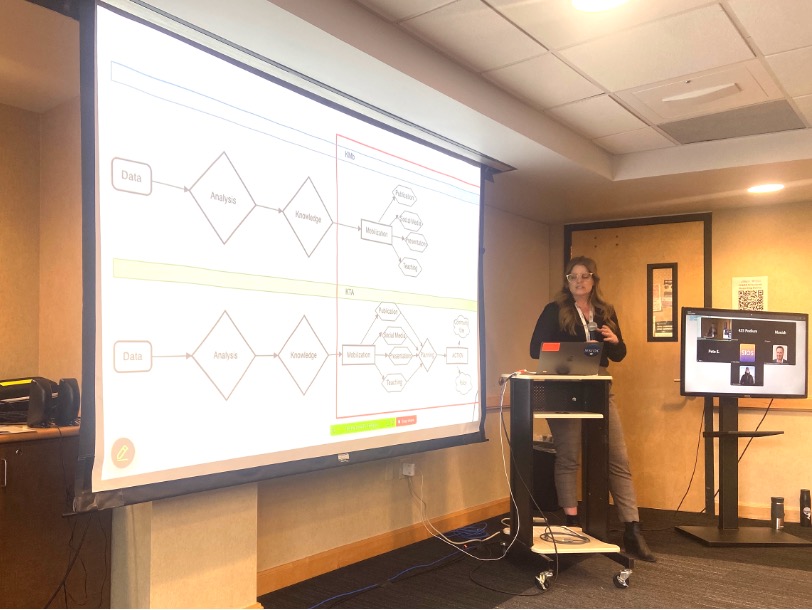
Chantelle Verhey giving her presentation on “Amplifying Impact Through Collaboration: Knowledge Mobilization and Data Sharing in Arctic Research”.
The session consisted of seven oral presentations on Thursday afternoon and nine poster presentations the previous evening. Presentations covered a vast array of topics including leveraging large language models for enhanced data access, data management tips and sharable resources, best practices for designing data repositories with researcher needs at the forefront, current happenings at various data centers, lessons learned since the last IPY to inform the next IPY, thinking about Indigenous data sovereignty and data openness, how collaborative open science practices can be improved, and much more. The session concluded with a short Q&A and discussion on the differences between operational and research data, the importance of semantics in the repository world, and questions regarding how repositories should deal with sensitive and/or non-traditional data.
Overall this session was extremely informative and successful in building connections and hearing researcher and repository perspectives on data sharing, management, and openness. Our team at the ADC is excited to participate in future Arctic research meetings and looks forward to continuing current collaborations and creating new connections.
